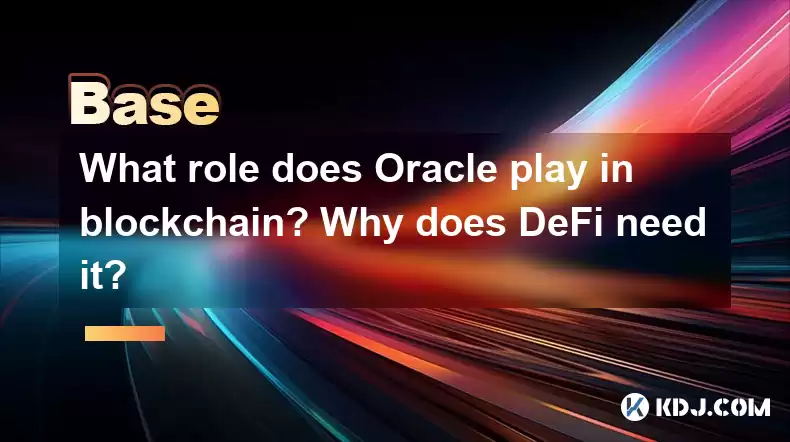-
 bitcoin
bitcoin $87959.907984 USD
1.34% -
 ethereum
ethereum $2920.497338 USD
3.04% -
 tether
tether $0.999775 USD
0.00% -
 xrp
xrp $2.237324 USD
8.12% -
 bnb
bnb $860.243768 USD
0.90% -
 solana
solana $138.089498 USD
5.43% -
 usd-coin
usd-coin $0.999807 USD
0.01% -
 tron
tron $0.272801 USD
-1.53% -
 dogecoin
dogecoin $0.150904 USD
2.96% -
 cardano
cardano $0.421635 USD
1.97% -
 hyperliquid
hyperliquid $32.152445 USD
2.23% -
 bitcoin-cash
bitcoin-cash $533.301069 USD
-1.94% -
 chainlink
chainlink $12.953417 USD
2.68% -
 unus-sed-leo
unus-sed-leo $9.535951 USD
0.73% -
 zcash
zcash $521.483386 USD
-2.87%
Welche Rolle spielt Oracle in Blockchain? Warum braucht Defi es?
Oracles are vital for DeFi, providing smart contracts with real-world data like prices, enabling functions in lending, DEXs, and stablecoins.
Apr 07, 2025 at 03:07 pm

Oracle spielt eine entscheidende Rolle im Blockchain -Ökosystem, insbesondere im Bereich der dezentralen Finanzierung (DEFI). Ein Oracle ist ein Dienst, der intelligente Verträge mit externen Daten bietet, mit denen sie mit der realen Welt interagieren können. Dies ist unerlässlich, da Blockchains nach Design isolierte Systeme sind, die nicht direkt auf keine Kettendaten zugreifen können. Ohne Orakel wären intelligente Verträge auf die Daten innerhalb ihres eigenen Netzwerks beschränkt, was ihre Funktionalität und Nützlichkeit stark einschränken.
Was ist ein Orakel in Blockchain?
Ein Orakel ist im Wesentlichen eine Brücke zwischen der Blockchain und der Außenwelt. Es holt, überprüft und liefert externe Daten an intelligente Verträge auf der Blockchain. Diese Daten können alles von Preisvorschriften, Wetterinformationen bis hin zum Ergebnis von Ereignissen umfassen. Durch die Bereitstellung dieser externen Daten ermöglichen Orakel intelligente Verträge auf der Grundlage realer Bedingungen aus, sodass sie vielseitiger und leistungsfähiger werden.
Wie funktionieren Oracles?
Orakel arbeiten durch eine Verbindung zu verschiedenen Datenquellen außerhalb der Blockchain. Sie sammeln diese Daten, verarbeiten sie und übertragen sie dann an die Blockchain in einem Format, das intelligente Verträge verwenden können. Der Prozess umfasst mehrere Schritte:
- Datenerfassung : Orakel sammeln Daten aus mehreren Quellen, um die Genauigkeit und Zuverlässigkeit sicherzustellen.
- Datenüberprüfung : Die gesammelten Daten werden verifiziert, um die Manipulation zu verhindern und ihre Integrität zu gewährleisten.
- Datenübertragung : Nach der Überprüfung werden die Daten an die Blockchain gesendet, wo sie durch intelligente Verträge zugegriffen werden können.
- Smart Contract Execution : Der Smart -Vertrag verwendet die Daten, um seine programmierte Logik auszuführen, z. B. das Auslösen einer Zahlung oder die Anpassung eines Parameters.
Warum ist Oracle für Defi wichtig?
Defi oder dezentrale Finanzen stützt sich stark auf Orakel, um effektiv zu funktionieren. Defi-Anwendungen wie Kreditplattformen, dezentrale Börsen und Stablecoins benötigen Echtzeitdaten, um zu arbeiten. Beispielsweise muss eine Kreditplattform den aktuellen Preis von Sicherheitenvermögen kennen, um die Verhältnisse von Kredit-zu-Wert-Wert zu ermitteln und das Risiko zu verwalten. Ohne Orakel könnten diese Plattformen nicht auf diese kritischen Daten zugreifen und sie unwirksam machen.
Beispiele für die Verwendung von Oracle in Defi
Mehrere Defi -Anwendungen zeigen die Bedeutung von Orakel:
- Dezentrale Börsen (DEXS) : Dexs verwenden Oracles, um Echtzeit-Preisdaten für Handelspaare zu holen. Dies stellt sicher, dass Geschäfte zu fairen Marktpreisen ausgeführt werden.
- Kreditplattformen : Plattformen wie aave und zusammengesetzte Orakel verwenden den Wert von Kollateralvermögen. Wenn der Wert unter einen bestimmten Schwellenwert fällt, kann die Plattform die Sicherheiten liquidieren, um Kreditgeber zu schützen.
- Stablecoins : Stablecoins wie DAI verwenden Oracles, um ihren PEG an eine Fiat -Währung zu halten. Das Oracle liefert den aktuellen Preis der Sicherheiten und ermöglicht es dem System, die Lieferung des Stablecoin entsprechend anzupassen.
Herausforderungen und Lösungen mit Orakel
Orakel sind zwar von wesentlicher Bedeutung, stellen aber auch Herausforderungen vor, insbesondere in Bezug auf die Genauigkeit und Sicherheit von Daten. Wenn ein Oracle falsche Daten liefert, kann dies zu erheblichen Problemen führen, z. B. falsche Darlehensflüssigkeiten oder Geschäfte von falsch bewertet. Um diese Herausforderungen zu bewältigen, wurden mehrere Lösungen entwickelt:
- Dezentrale Orakel : Anstatt sich auf ein einzelnes Orakel zu verlassen, aggregieren dezentrale Orakldaten aus mehreren Quellen. Dies verringert das Manipulationsrisiko und erhöht die Datenzuverlässigkeit.
- Kryptografische Überprüfung : Einige Orakel verwenden kryptografische Techniken, um die Integrität der von ihnen bereitgestellten Daten zu überprüfen. Dies fügt eine zusätzliche Sicherheits- und Vertrauensebene hinzu.
- Anreizmechanismen : Einige Orakelnetzwerke verwenden Incentive -Mechanismen, um ehrliche Berichterstattung zu fördern. Die Teilnehmer werden für die Bereitstellung genauer Daten belohnt und für die Bereitstellung falscher Informationen bestraft.
So integrieren Sie ein Orakel in einen intelligenten Vertrag
Die Integration eines Orakels in einen intelligenten Vertrag umfasst mehrere Schritte:
- Wählen Sie einen Oracle -Service : Wählen Sie einen seriösen Oracle -Service aus, der Ihren Anforderungen entspricht. Zu den beliebten Optionen gehören Chainlink, Bandprotokoll und Tellours.
- Richten Sie den Oracle -Vertrag ein : Bereiten Sie den Oracle -Vertrag auf der Blockchain ein. Dieser Vertrag interagiert mit dem Oracle -Dienst, um Daten abzurufen.
- Ändern Sie den Smart -Vertrag : Aktualisieren Sie Ihren Smart -Vertrag, um den Oracle -Vertrag anzurufen und die erforderlichen Daten abzurufen. Dies beinhaltet in der Regel eine Funktion, die Daten aus dem Orakel anfordert.
- Daten handhaben : Sobald das Oracle die Daten bereitstellt, muss Ihr Smart -Vertrag diese verarbeiten und die entsprechende Logik ausführen. Dies kann die Überprüfung von Bedingungen und das Auslösen von Aktionen basierend auf den empfangenen Daten beinhalten.
Häufig gestellte Fragen
F: Können Orakel für andere Zwecke als Defi verwendet werden?
A: Ja, Orakel können in verschiedenen anderen Anwendungen innerhalb des Blockchain -Ökosystems verwendet werden. Beispielsweise können sie im Supply Chain Management verwendet werden, um den Status von Waren, in Spielen zur Bereitstellung von Zufallszahlen oder in der Versicherung zu verfolgen, um Ansprüche auf der Grundlage realer Ereignisse zu überprüfen.
F: Wie sorgen Oracles für die Privatsphäre der Daten, die sie ausführen?
A: Orakel können verschiedene Techniken verwenden, um Datenschutz wie Verschlüsselung und Null-Wissen-Beweise sicherzustellen. Diese Methoden ermöglichen es Orakel, Daten für intelligente Verträge zu liefern, ohne vertrauliche Informationen aufzuteilen.
F: Was passiert, wenn ein Orakel offline geht oder keine Daten bereitstellt?
A: Um das Risiko eines Orakelversagens zu mildern, verwenden viele Systeme mehrere Orakel und implementieren Fallback -Mechanismen. Wenn ein Orakel offline geht, kann das System zu einem anderen Orakel wechseln oder einen vordefinierten Standardwert verwenden, bis das primäre Orakel wieder online kommt.
F: Gibt es Kosten für die Verwendung von Orakel?
A: Ja, die Verwendung von Oracles verursacht in der Regel Kosten, die Gebühren für das Abrufen von Daten, die Verarbeitung und Übertragung enthalten können. Diese Kosten variieren je nach Oracle -Dienst und der Komplexität der erforderlichen Daten.
Haftungsausschluss:info@kdj.com
Die bereitgestellten Informationen stellen keine Handelsberatung dar. kdj.com übernimmt keine Verantwortung für Investitionen, die auf der Grundlage der in diesem Artikel bereitgestellten Informationen getätigt werden. Kryptowährungen sind sehr volatil und es wird dringend empfohlen, nach gründlicher Recherche mit Vorsicht zu investieren!
Wenn Sie glauben, dass der auf dieser Website verwendete Inhalt Ihr Urheberrecht verletzt, kontaktieren Sie uns bitte umgehend (info@kdj.com) und wir werden ihn umgehend löschen.
-
 RAIN Jetzt handeln
RAIN Jetzt handeln$0.007852
113.00%
-
 PIPPIN Jetzt handeln
PIPPIN Jetzt handeln$0.06097
51.96%
-
 PARTI Jetzt handeln
PARTI Jetzt handeln$0.1396
42.04%
-
 WAVES Jetzt handeln
WAVES Jetzt handeln$0.9141
41.69%
-
 ARC Jetzt handeln
ARC Jetzt handeln$0.04302
35.73%
-
 HONEY Jetzt handeln
HONEY Jetzt handeln$0.01029
21.80%
- Die Bitcoin-Haltung der US-Regierung stabilisiert den wilden Ritt von Crypto inmitten der Marktvolatilität
- 2026-02-05 19:05:01
- Bärenmarktszenarien ausgepackt: Einblicke und Marktaussichten des Analysten PlanB
- 2026-02-05 19:00:02
- ZKsync-Preismanipulationsuntersuchung bei Upbit löst behördliche Kontrolle in Südkorea aus
- 2026-02-05 19:00:02
- BlockDAG boomt: Vorverkaufserfolg treibt die BDAG-Einführung inmitten des Marktbooms voran
- 2026-02-05 19:05:01
- Der Kreis Butuo bremst das Mining virtueller Währungen: Sichuans jüngste Razzia
- 2026-02-05 15:55:01
- Jenseits des Neonlichts: Ethereum-Casinos setzen neue Maßstäbe für Fairplay, Gebühren und Geschwindigkeit
- 2026-02-05 15:30:07
Verwandtes Wissen

Wie sieht die Zukunft der Kryptowährung und der Blockchain-Technologie aus?
Jan 11,2026 at 09:19pm
Dezentrale Finanzentwicklung 1. DeFi-Protokolle haben sich über die einfache Kreditvergabe und -aufnahme hinaus auf strukturierte Produkte, Versicheru...

Wer ist Satoshi Nakamoto? (Der Schöpfer von Bitcoin)
Jan 12,2026 at 07:00am
Ursprünge des Pseudonyms 1. Satoshi Nakamoto ist der Name der Einzelperson oder Gruppe, die Bitcoin entwickelt, das ursprüngliche Whitepaper verfasst ...

Was ist ein Krypto-Airdrop und wie bekomme ich einen?
Jan 22,2026 at 02:39pm
Krypto-Airdrops verstehen 1. Ein Krypto-Airdrop ist eine Verteilung kostenloser Token oder Münzen an mehrere Wallet-Adressen, die typischerweise von B...

Was ist ein vorübergehender Verlust bei DeFi und wie kann man ihn vermeiden?
Jan 13,2026 at 11:59am
Vergänglichen Verlust verstehen 1. Ein vorübergehender Verlust entsteht, wenn der Wert von Token, die in einen Liquiditätspool eines automatisierten M...

Wie kann man Krypto-Assets zwischen verschiedenen Blockchains überbrücken?
Jan 14,2026 at 06:19pm
Cross-Chain-Brückenmechanismen 1. Atomic Swaps ermöglichen den direkten Peer-to-Peer-Austausch von Vermögenswerten über zwei Blockchains ohne Zwischen...

Was ist ein Whitepaper und wie liest man es?
Jan 12,2026 at 07:19am
Die Whitepaper-Struktur verstehen 1. Ein Whitepaper im Bereich Kryptowährung fungiert als grundlegendes technisches und konzeptionelles Dokument, das ...

Wie sieht die Zukunft der Kryptowährung und der Blockchain-Technologie aus?
Jan 11,2026 at 09:19pm
Dezentrale Finanzentwicklung 1. DeFi-Protokolle haben sich über die einfache Kreditvergabe und -aufnahme hinaus auf strukturierte Produkte, Versicheru...

Wer ist Satoshi Nakamoto? (Der Schöpfer von Bitcoin)
Jan 12,2026 at 07:00am
Ursprünge des Pseudonyms 1. Satoshi Nakamoto ist der Name der Einzelperson oder Gruppe, die Bitcoin entwickelt, das ursprüngliche Whitepaper verfasst ...

Was ist ein Krypto-Airdrop und wie bekomme ich einen?
Jan 22,2026 at 02:39pm
Krypto-Airdrops verstehen 1. Ein Krypto-Airdrop ist eine Verteilung kostenloser Token oder Münzen an mehrere Wallet-Adressen, die typischerweise von B...

Was ist ein vorübergehender Verlust bei DeFi und wie kann man ihn vermeiden?
Jan 13,2026 at 11:59am
Vergänglichen Verlust verstehen 1. Ein vorübergehender Verlust entsteht, wenn der Wert von Token, die in einen Liquiditätspool eines automatisierten M...

Wie kann man Krypto-Assets zwischen verschiedenen Blockchains überbrücken?
Jan 14,2026 at 06:19pm
Cross-Chain-Brückenmechanismen 1. Atomic Swaps ermöglichen den direkten Peer-to-Peer-Austausch von Vermögenswerten über zwei Blockchains ohne Zwischen...

Was ist ein Whitepaper und wie liest man es?
Jan 12,2026 at 07:19am
Die Whitepaper-Struktur verstehen 1. Ein Whitepaper im Bereich Kryptowährung fungiert als grundlegendes technisches und konzeptionelles Dokument, das ...
Alle Artikel ansehen























![KING vs PAINIFY😳 (1v1 ZONEWARS) [FORTNITE TOKEN/WAGER] KING vs PAINIFY😳 (1v1 ZONEWARS) [FORTNITE TOKEN/WAGER]](/uploads/2026/02/05/cryptocurrencies-news/videos/origin_6984035326d58_image_500_375.webp)


















































